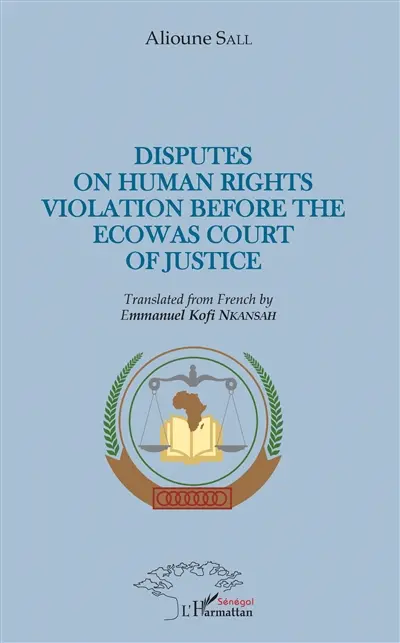en savoir plus

Permet à tous ses détenteurs d'obtenir 5% de réduction sur tous les livres lors du retrait en magasin (réduction non cumulable avec les réductions de type étudiant).
Offre également un certain nombre d'avantages auprès de nos partenaires.
Avec les favoris, retrouvez dans un espace les sélections effectuées au fur et à mesure de vos navigations dans le site.
Constituez pour votre usage personnel vos listes de livres en prévisions d'achats futurs et votre sélection d'articles, dossiers, événements, vidéos ou podcasts préférés ou à découvrir plus tard...
Il suffit simplement de cliquer sur "Ajout Favori" sur chaque page qui vous intéresse pour les retrouver ensuite dans votre espace personnel.
Requiert un compte Mollat
Requiert un compte Mollat
Disputes on human rights violation before the ECOWAS court of justice
Auteur : Alioune Sall
en savoir plus
Résumé
Une analyse de la jurisprudence de la Cour de justice de la CEDEAO. Les différentes phases du procès sont également examinées. L'auteur interroge ainsi le contentieux international des droits de l'homme ainsi que le devenir de cette juridiction. ©Electre 2026
Quatrième de couverture
Mandated to make judgments on human rights cases since 2005, the ECOWAS Court of Justice has undeniably acquired the reputation of a forum for human rights protection, in the manner of courts of justice as prestigious as the European Court of Human Rights, the Inter-American Court of Human Rights or the African Court on Human and Peoples' Rights. With no systematic study of the Court's human rights jurisprudence having been undertaken till today, this work comes to fill the gap.
Part I of the book presents the body of case law emerging after fifteen years of practice. Two feats must be acknowledged here. The feat of the Court itself, whose original mandate was, and is still in force any rate, that of a custodian of the norms of economic integration, not adjudication on human rights violation. The human rights case law of the Court was therefore born out of a sustained effort, not devoid of approximations and sometimes mistakes, all the more deserving of commendation, because unlike similar judicial bodies, it had succeeded in ridding itself of what the author calls « a pointer of orientation for the norms relied upon », a single codified body of rules of reference. Then, the exploits of the author, who succeeded, in an effort of re-composition, in sustaining, by a consummate art of summary, a reconstitution of the various phases of the trial proceedings, and in retrieving and discussing in a systematic manner, the viewpoints of the Court.
Part II is made up of a collection of studies whose themes centre on the major interrogations of international disputes on human rights : the status of the applicants, relations between the Court and other sister or rival courts of justice, the dialectics of relationship between the national judge and the international judge, etc. Part II closes up with a prospective reflexion on « The Future of the Court », where the author expresses his hopes, but also his serious concerns regarding what is to become of a court whose usefulness and cathartic function are not lost on him.
The book is, as always, written in pure delightful language, and the analyses, nourished with the experience of the judge that the author was, are remarkable in richness, finesse and depth.
Fiche Technique
Paru le : 02/07/2019
Thématique : Droits de l'homme
Auteur(s) : Auteur : Alioune Sall
Éditeur(s) :
L'Harmattan
Collection(s) : Non précisé.
Contributeur(s) : Traducteur : Emmanuel Kofi Nkansah
Série(s) : Non précisé.
ISBN : 978-2-343-17955-1
EAN13 : 9782343179551
Reliure : Broché
Pages : 272
Hauteur: 24.0 cm / Largeur 16.0 cm
Épaisseur: 1.5 cm
Poids: 434 g

